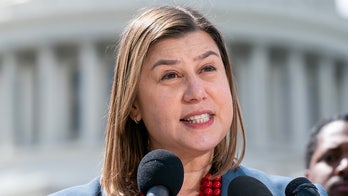If the Big Three automakers' warnings of impending disaster and pledges to clean up their acts didn't rally Capitol Hill lawmakers, the frightening figures from the Labor Department sure did.
The figures released Friday showed employers cut 533,000 jobs in November, the most in 34 years, pushing the unemployment rate up to 6.7 percent. That alarming report has provided an impetus to finding a legislative solution to the automakers' woes, said Democratic Rep. Barney Frank, chairman of the House Financial Services Committee.
"The disastrous jobs report has heightened the interest in doing something," said Frank, whose panel heard testimony Friday. He added there was "consensus" that Congress should take action -- though that was no "guarantee of success," and it isn't clear what kind of solution is being drafted.
The CEOs of General Motors, Ford and Chrysler returned to Capitol Hill this week with fresh business plans and an eye toward energy-efficient innovation, after a botched attempt last month at seeking federal aid. Their latest pitches, for $34 billion in loans, have run up against lawmakers' skepticism, but the jobs numbers seemed to bolster the automakers' case before Congress.
Frank said he will hammer out a proposal over the weekend with congressional leaders, including Sen. Chris Dodd, D-Conn., chairman of the Senate Banking Committee.
"I hope we will do something, because I think for us to do nothing, to allow bankruptcy or failures for one, two or three of these companies ... would be a disaster," Frank said.
Senate Majority Leader Harry Reid released a written statement also emphasizing the jobs numbers.
"Congress has an obligation to keep this dangerous situation from getting worse -- inaction is not an option," Reid said.
Whether the nail-biting over the Labor report would provide lawmakers enough political cover to send the three automakers the money they are requesting is unclear.
There are several options. One, which senior Democratic aides say is gaining traction, is to tap money from the $700 billion financial bailout package, as well as money from an existing $25 billion Energy Department fund. Michigan Rep. Thaddeus McCotter, R, strongly advocated that approach Friday.
President Bush, saying for the first time that the economy is in a "recession," called on Congress to just adjust the $25 billion loan program so that the money would be available more quickly. The money originally was intended to help retool factories to produce more energy-efficient cars.
Democratic leaders and environmentalists oppose changing that program. Instead, some want the Bush administration to tap directly into the $700 billion, which would require no congressional action. The Bush administration has balked at that proposal.
Despite the latest jobs report, lawmakers still expressed concern Friday that a federal bailout of the Big Three would be unwise.
"I'm concerned that businesses are rightly going to start thinking that they can just come to Uncle Sam to bail them out, and we're broke," Republican Rep. J. Gresham Barrett of South Carolina said. And Republican Rep. Donald Manzullo of Illinois said the automakers' proposals were "woefully insufficient" because they did not address consumer demand.
Republican Rep. Spencer Bachus of Alabama, though, endorsed the possibility of "limited, transitional assistance" on behalf of the government that puts the onus on the auto industry to return itself to profitability.
"What we need is a solution, not a first installment," he warned.
The CEOs pledged, as they did before the Senate Banking Committee on Thursday, to mend their ways, put more focus on fuel-efficient vehicles and engineer a more efficient business model. They pitched the bailout money as a bridge over the economic crisis that will lead to the road to profitability.
"I recognize that this is a significant amount of public money," Chrysler CEO Robert Nardelli said. "However, we believe this is the least costly alternative considering the depth of the economic crisis and options we face."
Ron Gettelfinger, president of the United Auto Workers union, urged Congress to approve an emergency bridge loan and said there is "not enough time" for Congress to hammer out a complete restructuring plan in the coming weeks.
Under one plan, the government would order a major restructuring of Detroit's struggling Big Three auto companies in exchange for the multibillion-dollar bailout.
Finding the money was proving to be an uphill battle. Congressional budget analysts said the proposal to use the already approved fund set aside for making cars environmentally efficient would provide just $7.5 billion, a fraction of what GM, Ford and Chrysler say they need.
FOX News' Chad Pergram and Trish Turner and The Associated Press contributed to this report.




